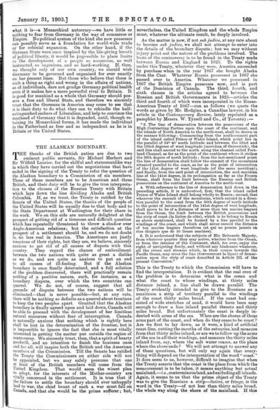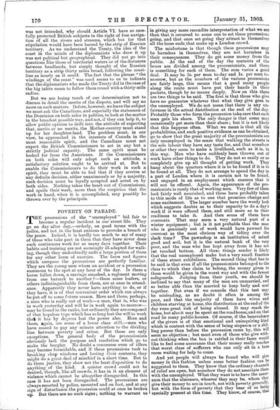THE ALASKAN BOUNDARY.
TE thanks- of the British nation are due to two eminent public servants, Sir Michael Herbert and. Sir Wilfrid Laurier, for the skilful and statesmanlike way in which they have carried, out the negotiations that have ended in the signing of the Treaty to refer the question of the Alaskan boundary to a Commission of six members. Three of these members are to be American and. three British, and their duty will be to give the true interpreta- tion to the clauses Of the Russian Treaty with Britain which lays down the line dividing Alaska and British Columbia. If, as we trust, the Treaty is ratified by the Senate of the United States, the thanks of the people of the United States will be equally due to that body and to the State Department at Washington for their share in the work. We on this side are naturally delighted at the prospect of getting rid of a tiresome and difficult question which has repeatedly threatened to throw a shadow over Anglo-American relations ; but the satisfaction at the prospect of a settlement should be, and we do not doubt is, no less real in America. The Americans are justly tenacious of their rights, but they are, we believe, sincerely anxious to get rid of all causes of dispute with this country. They regard the chance of embroilment between the two nations with quite as great a dislike as we do, and are quite as anxious to put an end to all causes of ill-feeling. But if the Alaskan boundary is once finally, determined, and a full solution of the problem discovered, there will practically remain nothing of a positive nature, such, for instance, as a boundary dispute, over which the two countries can quarrel. We do not, of course, suggest that all grounds of dispute between the two nations will be eliminated—that is never possible—but, at any rate, there will be nothing so definite as a quarrel about frontiers to keep the two peoples apart. Granted that the Alaskan boundary is finally agreed upon and laid down, Canada will be able to proceed with the development of her limitless natural resources without fear of interruption. Canada is naturally anxious that nothing which is rightly hers shall be lost in the determination- of the frontier, but it is impossible to ignore the- fact that she is most vitally intereated in getting the matter put outside the region of controversy. We sincerely-trust, then, that a spirit of hearty goodwill, and an intention to finish the business once and for all, will inspire both the British and the American members of the Commission. Till the Senate has ratified. the Treaty the Commissioners on either side will not be appointed, but we may safely presume that one at least of the . British members will come from the "United Kingdom. That • would seem the wisest plan to adopt, for the interests of the Mother-country are vitally concerned in the settlement. It is true that if the failure to settle the boundary should. ever unhappily lead to war, the chief brunt of such a war must fall on Canada, and, that she would be the prime sufferer ; but, nevertheless, the United Kingdom and the whole Empire must, whatever the ultimate result, be deeply involved.
As the matter is now, if not sub juclice, at any rate about to become sub juclice, we shall not attempt to enter into the details of the boundary dispute;. -but we may without injury point out the nature of the problems involved. The basis of the controversy is to be found in the Treaty made between Russia and England in 1825. To the rights under this Treaty, whatever they were, America succeeded by purchase when in the year 1867 she bought Alaska from the Czar. Whatever Russia possessed in 1867 she passed. over to America. Whatever we possessed in 1867 the British Empire possesses now, and is part of the Dominion of Canada. The third, fourth, and sixth clauses in the articles agreed. to between the Russian and British Governments in 1825—articles the third and fourth of which were incorporated in the Russo- American Treaty of 1867—run as follows (we quote the words as given by Mr. Hodgins, a Canadian lawyer, in his article in the Contemporary Review, lately reprinted. as a pamphlet by Messrs. W. Tyrrell and. Co., of Toronto) :— " 3. The line of demarcation between the possessions of the High Contracting Parties upon the coast of the continent, and the islands of North America to the north-west, shall be drawn in the manner following : Commencing from the southernmost part of the island called Prince of Wales Island, which point lies in the parallel of 540 49' north latitude and between the 131st and the 133rd degrees of west longitude (meridian of Greenwich), the said line shall ascend to the north along the channel called Port- land Channel, as far as the point of the continent where it strikes the 56th degree of north latitude ; from the last-mentioned point the line of demarcation shall follow the summit of the mountains situated parallel to the coast, as far as the point of intersection of the 141st degree of west longitude (of the same meridian); and finally, from the said point of intersection, the said meridian line of the 141st degree, in its prolongation as far as the Frozen Ocean, shall form the limit between the Russian and British possessions on the continent of America to the north-west.
4. With reference to the line of demarcation laid down in the preceding article, it is understood, first,' that the island called Prince of Wales Island shall belong wholly to Russia ; second, that wherever the summit of the mountains, which extend in a direc- tion parallel to the coast from the 56th degree of north latitude to the point of intersection of the 1418t degree of west longitude, shall prove to be of a distance of more than ten marine leagues from the Ocean, the limit between the British possessions and the strip of coast (la lisiere de alto), which is to belong to Russia as above mentioned, shall be formed by a line parallel to the windings of the coast, and which shall never exceed the distance of ten marine leagues therefrom (et qui no poarra jainais en etre eloignee quo de 10 lieues marines).
6. It is understood that the subjects of His Britannic Majesty, from whatever quarter they may arrive, whether from the Ocean, or from the interior of the Continent, shall, for ever, enjoy the right of navigating freely, and without any hindrance whatever, all the rivers and streams which, in their course towards the Pacific Ocean, may cross the line (traverseront la ligne) of demar- cation upon the strip of coast described in Article IIL of 'the present Convention."
This is the Treaty to which the Commission will have to find the interpretation. It is evident that the real crux of the problem is to determine what is the ocean and what the coast to whose windings, at thirty 'miles distance inland, a line shall be drawn parallel. This Treaty evidently intended to give to the Russians as.' maximum a strip of territory parallel to the windings of the coast thirty miles broad. If the coast had. con- sisted of wide stretches of sand, it would have been easy, enough to draw a line inland. parallel thereto and thirty miles broad. But unfortunately the coast is deeply in- dented with arms of the sea. When are the shores of thaw arms part of the coast, and when do they cease to be coast'? Are we first to lay down, as it were, a kind of artificial coast-line, cutting the mouths of the estuaries;and measure from that thirty miles inland, or are we to follow up the arnis of the sea in all their windings, and. measure the thirty miles inland from, say, where the salt water ceases, as the place where the shore ends ? We will not attempt to answer any of these questions, but will only say again that every- thing will depend on the interpretation of the word." coast." It does seem to us, however, difficult to imagine that when the Treaty asserts that the coast is the place from ivhich the measurement is to be taken, it means anything but actual mainland,—i.e., conterminous land, and excluding all islands. Again, it seems to us that the prime object of the Treaty was to give the Russians a strip—lisiare, or fringe; is the word in the Treaty—of not less than thirty miles broad, the whole way along the shore of the mainland. If this was not intended, why should Article VI. have so care- fully protected British subjects in the right of free naviga- tion of all the rivers and streams, which but for that stipulation would have been barred by the strip of Russian territory. As we understand the Treaty, the idea of the coast in the minds of the diplomatists who drew it up was not political but geographical. They did not go into questions like those of territorial waters or of the distances between headlands, but simply thought of the Russian territory as a strip thirty miles broad, following the coast- line as nearly as it could. The fact that the phrase "the windings of the coast" was used seems to us to indicate that the diplomatists who made the Treaty did in the case of the big inlets mean to follow them round with a thirty-mile radius.
But we are losing touch of our determination not to discuss in detail the merits of the dispute, and will say no more on such matters. Before, however, we leave the subject we must ask the Canadians, and especially the statesmen of the Dominion on both sides in politics, to look at the matter in the broadest possible way, and not, if they can help it, to allow public opinion to drift into the attitude of expecting that, merits or no merits, the Mother-country must stand up for her daughter-land. The problem must, in our view, be approached in the interests of Canada in the most reasonable spirit, and the Canadians must not expect the British Commissioners to act in any but a strictly judicial capacity. The same spirit must be looked for from the Americans. If the Commissioners on both sides will only adopt such an attitude, a satisfactory solution ought to be arrived at. But to enable the Commissioners to do their work in such a spirit, they must be able to feel that if they arrrive at any definite decision, either unanimously or by a majority, such decision must be loyally accepted and acted on by both sides. Nothing takes the heart out of Commissions, and spoils their work, more than the suspicion that the work in hand, when it is accomplished, may possibly be thrown over by the principals.























































 Previous page
Previous page